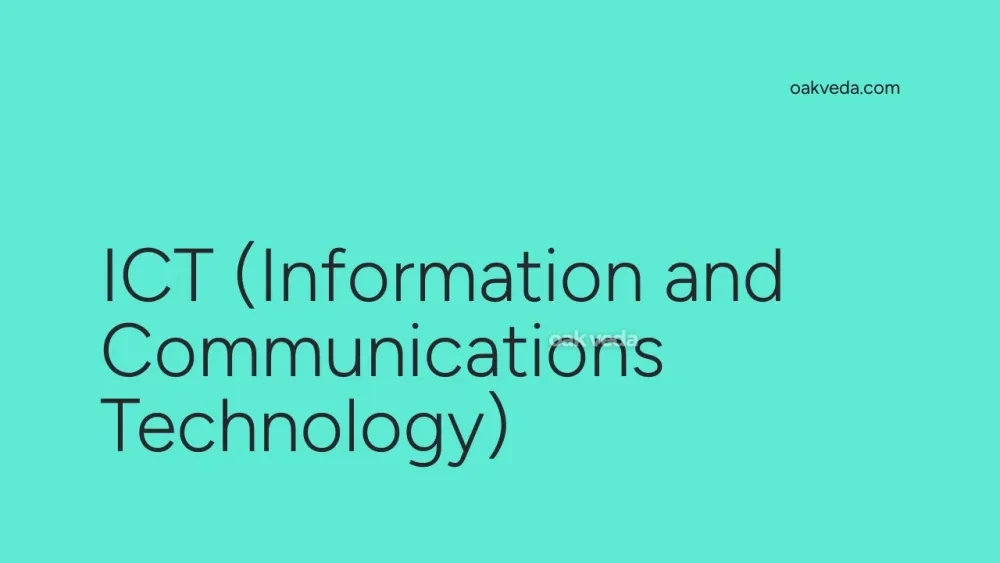
What is the Full Form of ICT?
The full form of ICT is Information and Communications Technology. This term encompasses a wide range of technologies and tools used for managing, processing, and transmitting information in various forms.
What is Information and Communications Technology?
Information and Communications Technology (ICT) refers to the integration of telecommunications, computers, and various digital systems that enable users to access, store, transmit, and manipulate information. It's a broad term that covers all devices, networking components, applications, and systems that allow people and organizations to interact in the digital world.
Origin and Development of Information and Communications Technology
The concept of ICT has evolved significantly over the past few decades. While the term itself gained popularity in the 1980s, the foundations of ICT can be traced back to the development of early computing systems and telecommunications networks. The rapid advancement of digital technologies, the internet, and mobile communications has shaped ICT into the comprehensive field it is today.
How does Information and Communications Technology work?
ICT functions through a complex interplay of various components:
- Hardware: Physical devices like computers, smartphones, and servers
- Software: Programs and applications that run on hardware
- Networks: Infrastructure that allows data transmission between devices
- Data: The information processed and stored by ICT systems
These components work together to enable the creation, storage, processing, and exchange of digital information across various platforms and devices.
Types of Information and Communications Technology
ICT encompasses several key areas:
- Telecommunications: Including mobile networks, internet services, and satellite communications
- Computing: Covering personal computers, servers, and cloud computing services
- Audio-visual systems: Such as video conferencing tools and multimedia platforms
- Enterprise software: Including customer relationship management (CRM) and enterprise resource planning (ERP) systems
- Internet of Things (IoT): Connecting everyday devices to the internet for enhanced functionality
Functions of Information and Communications Technology
ICT serves multiple functions in modern society:
- Communication: Facilitating instant global communication through various channels
- Information Access: Providing easy access to vast amounts of information
- Data Management: Enabling efficient storage, retrieval, and analysis of data
- Process Automation: Streamlining business processes and operations
- Innovation: Driving technological advancements and new business models
Applications of Information and Communications Technology
ICT has widespread applications across various sectors:
- Business: Enhancing productivity, customer service, and decision-making
- Education: Facilitating e-learning, digital classrooms, and educational resources
- Healthcare: Supporting telemedicine, electronic health records, and medical research
- Government: Improving public services, e-governance, and citizen engagement
- Entertainment: Enabling streaming services, gaming, and digital content creation
Features of Information and Communications Technology
Key features of ICT include:
- Connectivity: Allowing seamless communication and data exchange
- Interactivity: Enabling real-time user engagement and feedback
- Automation: Streamlining repetitive tasks and processes
- Scalability: Adapting to growing data and user needs
- Convergence: Integrating various technologies and platforms
Benefits of Information and Communications Technology
ICT offers numerous benefits:
- Improved Efficiency: Automating tasks and streamlining processes
- Enhanced Communication: Facilitating global collaboration and information sharing
- Cost Reduction: Lowering operational costs through digital solutions
- Innovation: Driving new products, services, and business models
- Accessibility: Providing wider access to information and services
- Flexibility: Enabling remote work and flexible business operations
Limitations or Challenges of Information and Communications Technology
Despite its advantages, ICT faces several challenges:
- Digital Divide: Unequal access to technology and digital skills
- Security Concerns: Increased vulnerability to cyber threats and data breaches
- Rapid Obsolescence: Constant need for upgrades and new skills
- Privacy Issues: Concerns over data collection and user privacy
- Environmental Impact: Energy consumption and e-waste management
Future Developments in Information and Communications Technology
The future of ICT looks promising with emerging technologies:
- 5G and Beyond: Ultra-fast, low-latency networks
- Artificial Intelligence: Advanced AI integration in various applications
- Quantum Computing: Revolutionary computing power for complex problems
- Extended Reality: Merging physical and digital worlds through AR and VR
- Edge Computing: Bringing computation closer to data sources for faster processing
FAQs on ICT Full Form
-
What does ICT stand for in education? In education, ICT stands for Information and Communications Technology, referring to the use of digital tools and resources in teaching and learning.
-
How is ICT different from IT? While IT (Information Technology) focuses primarily on computer-based information systems, ICT is broader, encompassing both IT and communication technologies.
-
What are some examples of ICT devices? Examples include smartphones, computers, tablets, smart TVs, and IoT devices.
-
How does ICT impact business? ICT enhances business operations through improved communication, data management, customer service, and process automation.
-
What skills are needed for a career in ICT? Key skills include programming, network management, data analysis, cybersecurity, and adaptability to new technologies.
In conclusion, Information and Communications Technology (ICT) plays a crucial role in shaping our digital world. Its impact spans across various sectors, driving innovation, efficiency, and connectivity. As technology continues to evolve, ICT will remain at the forefront of digital transformation, presenting both opportunities and challenges for individuals, businesses, and society as a whole.
You may be interested in:
- NET (National Eligibility Test) Full Form
- Mbps (Megabits Per Second): Full Form Explained
- JAIIB (Full Form): Junior Associate of Indian Institute of Bankers
- CTC (Cost To Company): Full Form and Explanation
- HVAC (Heating, Ventilation, and Air Conditioning)
- SAP (Systems Applications and Products) Full Form

